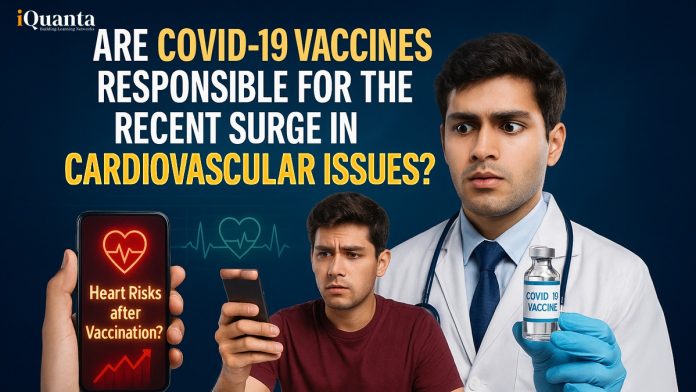What if the safety measures you take turn out to be costing you a lot more? This is exactly what the world is talking about right now? But, all that is being said is not true until proven with definite facts. The onset of the pandemic brought along with it an avalanche of information- some was accurate, some was conflicting, and some was outright confusing. This blog unpacks a popular myth regarding COVID-19 vaccines. Among the numerous swirling debates, one question that continues to echo loudly is, “Are COVID-19 vaccines responsible for an increase in cardiovascular problems like strokes, arrhythmia, and heart attacks?”
The short answer? No, they’re not the culprit, but not completely innocent either. Let’s dig deeper!

Join the free NEET whatsapp group for latest NEET updates and other important information
A Pandemic of Massive Scale – What Did It Leave Behind
Let’s first set the stage. The World Health Organization reported over 771 million confirmed cases of COVID-19 worldwide. The cost of the pandemic was the lives of 6.9 million people. In response, over 11.8 billion vaccine doses have been administered globally. The world calls it a historic medical achievement. But with this vast scale came valid public health concerns. The chief among them is whether the COVID-19 vaccine is taking a toll on our hearts!
Could the COVID-19 Vaccines be Harming the Heart?
Several studies have taken a magnifying glass to the cardiovascular effects of COVID-19 vaccines, but their findings have not all been in agreement. Let’s look into multiple aspects in detail:
What the Science Says- It’s Complicated, but Not Alarming
Research showed that, after vaccination, there was a noticeable increase in cardio related incidents like myocardial infarction, commonly known as heart attack, along with stroke and arrhythmia, a condition that disbalances the heart beat rate. However, on the brighter side, similar studies found no such link. Few studies have claimed a protective effect, especially after the third vaccine dose.
So, who’s right?
A Meta-Analysis That Took It All Into Account
Given the ongoing noise and tension surrounding the implications of COVID-19 vaccines, researchers conducted a Bayesian multivariate meta-analysis. It looked across 15 studies using advanced statistical modelling. One of the methods used is Markov Chain Monte Carlo method.
It resulted in four key outcomes:
Coronary Artery Disease (CAD), Stroke, Myocardial Infarction and Arrhythmia.
Here are the findings:
- There was a slight increase in Coronary Artery Disease (CAD) after vaccination.
- The overall CAD risk was OR 1.70 (95% CrI: 1.11-2.57)
- After the second dose of Pfizer (BNT162b2), the CAD risk was recorded to be higher at OR 3.44.
- For other cardiovascular diseases like Stroke, Heart Attack and Arrhythmia, there was no increased risk. Instead, it led to improved results.
- After the third vaccine dose, the risk of Stroke significantly dropped to OR 0.19.
- There was a sudden fall of Heart Attack risk to OR 0.003.
Analysis:
- Coronary Artery Disease (CAD): Slightly increased risk
- Stroke: Risk dropped significantly (after 3rd dose)
- Myocardial Infarction (Heart Attack): Risk Dropped Instantly
- Arrhythmia: No increased risk.
The overall takeaway is reassuring with a slightly increased risk for Coronary Artery Disease (CAD), but decrease in risk for Stroke and Heart Attack. No increased risk was recorded for Arrhythmia.
Thus, we can conclude that COVID-19 vaccines are not driving a cardiovascular crisis.
What About The Other Two – Myocarditis and Pericarditis
Pericarditis is the inflammation of heart lining and Myocarditis is the inflammation of heart muscle. The reason behind these mentions are a bit concerning. After the second dose of mRNA vaccine, the diagnosis of Myocarditis and Pericarditis increased among younger males.
How serious is it? The cases exist, but on the rare end!
- In every 100,000 recipients, 2-12 such cases were found.
- Approximately 10 in every 100,000 vaccine receipent was diagnosed with one of these.
- The diagnosis was highest in males aged 16-29.
- The severity of the diagnosis was mild and treatable. It is often resolved with complications.
COVID-19 Infection or COVID-19 Vaccination: Let’s Talk About The Real Cardiac Threat
Let’s state the fact first! COVID-19 virus is far more dangerous for your heart than COVID-19 vaccination. Here’s why-
In a massive review across 40 health systems for individuals aged 5+, the cardiovascular complications was higher post-COVID when compared to post-vaccine period. Furthermore, in a study conducted in Israel, the risk of inflammation in heart muscle as a result of COVID-19 infection was 5+ times higher than from COVID-19 vaccines.
So What’s Really Behind the Surge in Heart Problems?
Despite online speculation, there’s no evidence of a broad increase in heart disease tied to vaccines. If anything, experts say increases in cardiovascular events during the pandemic are more likely due to:
- COVID-19 infections themselves
- Delayed routine checkups and treatments
- Increased stress, poor diet, and inactivity during lockdowns
What Do Researchers Have to Say?
Researchers confirm that severe COVID infection, and not COVID‑19 vaccination, is behind the rise in cardiovascular risks.
Statement: COVID‑19 dramatically increases heart risks.
Proof: In a study, comprising 10,000 non-vaccinated adults in 2020 and 2,00,000 uninfected adults, it was found that COVID-19 raised the risk of cardiovascular ailments like stroke, heart attack and even death by more than two times, lasting up to 3 years post-infection. It is also said that those hospitalized with COVID-19 had four times higher risk compared to the uninfected.
Statement: ABO blood type matters:
Proof:Individuals with A, B, or AB blood types had a 65% higher chance of heart attack or stroke compared to those with type O
How Risky is Severe COVID for the Heart?
Turns out, it’s just as dangerous as having major health conditions like diabetes or artery disease. In fact, being hospitalized with COVID is now seen as a heart disease risk equivalent just like having diabetes increases your chances of a heart attack, so does severe COVID.
But why does this happen?
When COVID hits hard, it triggers intense inflammation in the body. This can:
- Speed up plaque buildup in your arteries
- Increase the chances of blood clots
- Lead to heart attacks, strokes, or lung clots (pulmonary embolism)
The worst part?
This heart risk doesn’t disappear after recovery. People who were hospitalized or in the ICU still carry this higher risk for years.
As an end-note, severe COVID sets off a chain reaction, inflammation, clotting, artery damage, which can leave long-term scars on your heart. The recent rise in heart issues? It’s not the vaccines causing it. It’s the virus itself.





